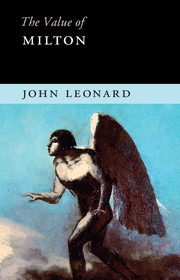Book contents
- Frontmatter
- Dedication
- Contents
- Preface
- Textual note
- 1 Areopagitica, toleration and free speech
- 2 The minor poems and ‘the power / to save’
- 3 The political prose: ‘in liberty's defence’
- 4 Paradise Lost, the sublime poem
- 5 Paradise Lost, ‘solid good’
- 6 Paradise Regained, ‘To the utmost of mere man’
- 7 Samson Agonistes, tragedy and terror
- Notes
- Index
3 - The political prose: ‘in liberty's defence’
Published online by Cambridge University Press: 05 July 2016
- Frontmatter
- Dedication
- Contents
- Preface
- Textual note
- 1 Areopagitica, toleration and free speech
- 2 The minor poems and ‘the power / to save’
- 3 The political prose: ‘in liberty's defence’
- 4 Paradise Lost, the sublime poem
- 5 Paradise Lost, ‘solid good’
- 6 Paradise Regained, ‘To the utmost of mere man’
- 7 Samson Agonistes, tragedy and terror
- Notes
- Index
Summary
Milton never abandoned his poetic ambitions though the onset of complete blindness in 1652 led him briefly to doubt whether he would fulfil them. In the event, blindness spurred his return to poetry and maybe empowered him to write his epic. Homer had set the pattern for blind bards and Milton accepted blindness as divine confirmation of his epic destiny. But for most of his middle years he answered a different calling. His prose has traditionally been valued less highly than his poetry, partly because the political issues he addresses remain divisive and partly because Milton himself speaks slightingly of his prose. Or rather, he spoke slightingly of his early prose. In a famous passage in The Reason of Church Government (1642), he confesses that he feels out of his element: ‘I should not choose this manner of writing wherein knowing myself inferior to myself … I have the use, as I may account it, but of my left hand’ (CPW 1:808). These words have often been quoted out of context as if they applied to all of Milton's prose, but they were written early in his pamphleteering career, before Areopagitica or the great Latin tracts defending the English republic. We should not assume that Milton saw those works as achievements of his ‘left hand’. If his prose was undervalued by earlier generations, that has not been the case in recent years, when scholars have attended to the prose even at the expense of the poetry. My own view is that the poetry matters most and I have accordingly prioritized it in this book, but that is due to constraints of space. I do not wish to advocate a return to the days when the prose was condescended to. Milton had two great ambitions. He wanted to be the English Homer or Virgil (and eventually, in Samson Agonistes, Aeschylus, Sophocles, Euripides) and he also aspired to be the English Isocrates, Demosthenes or Cicero: a champion of liberty inspiring his countrymen and all of Europe with stirring oratory. He achieved both ambitions and both are part of his enduring value.
Looking back on his prose career in his Latin Second Defence of the English People (1654), Milton classifies his pamphlets into three groups corresponding to three kinds of liberty.
- Type
- Chapter
- Information
- The Value of Milton , pp. 44 - 62Publisher: Cambridge University PressPrint publication year: 2016



